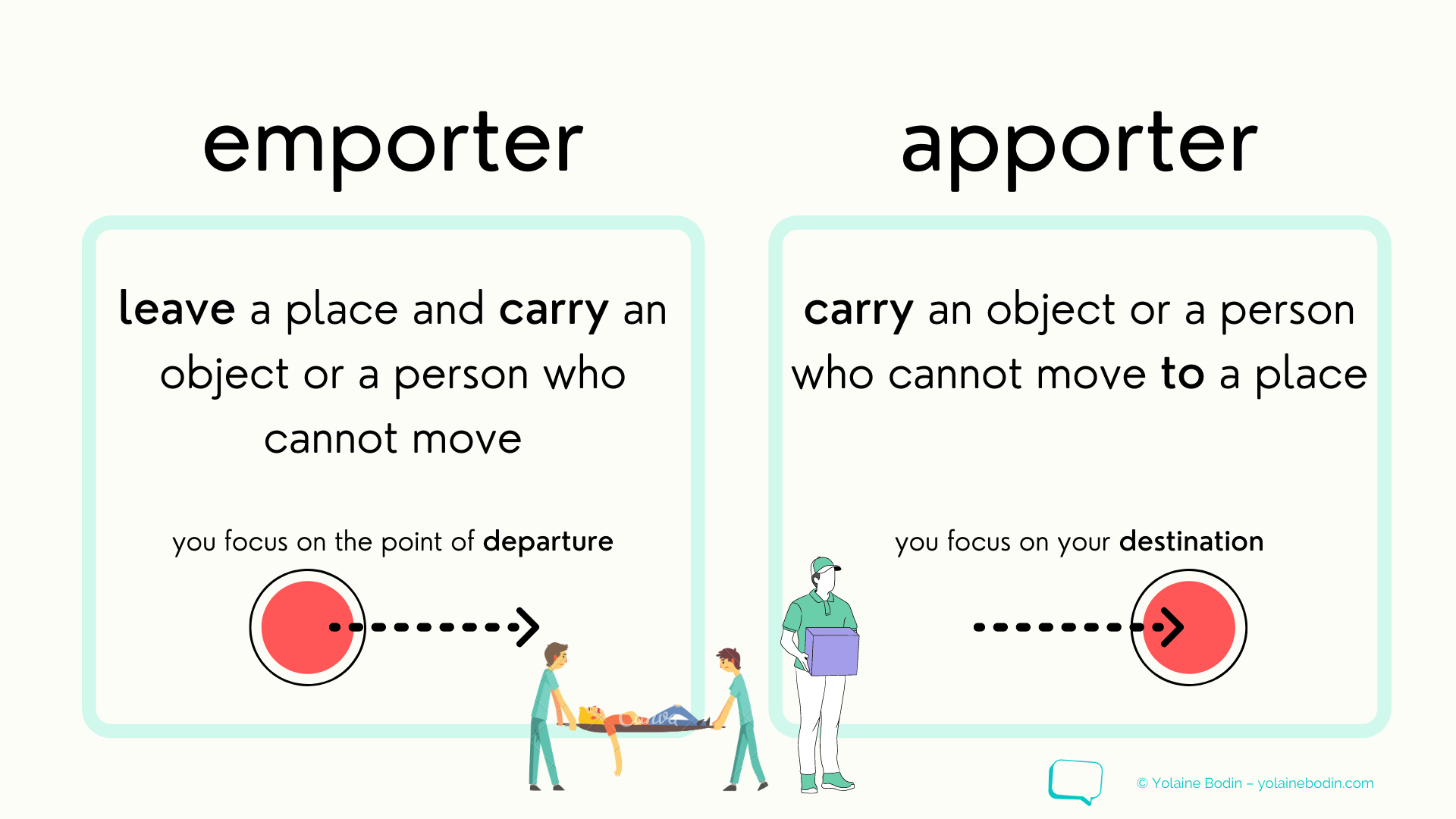Choosing between apporter, emporter, amener and emmener is a common difficulty among French learners. Indeed, these verbs are similar and confusing, and the difference between them is not blatant.
During my French conversation classes, I often notice a lot of hesitation from participants in choosing between apporter and emporter for example, or between amener and emmener, but also between apporter and amener, and between emporter and emmener.
To learn how to choose between these verbs, first of all, let’s look at what they are made of.
First observation: Two verbs are built from the verb porter, and two from the verb mener.
Second observation: we can see they contain two possible prefixes: a– and em–
These observations will help understand their specific meanings and thus the difference between them.
Mener means to lead, take a person or an animal. Imagine taking a person by the hand (par la main, with an M as in mener)
The difference between emmener and amener depends on whether you focus on the point of departure or the destination.
Emmener is used when you focus on the point of departure: it means you leave a place and take someone with you.
Amener is used when you focus on the destination: it means you lead or take a person to a place.

Porter means to carry (take something and carry it somewhere). You can carry an object or a person who cannot move (for example an injured person). Think of it, if the person cannot move, you will have to carry them very much like an object.
Useful tip: The object, like a person who cannot move, is passive, with a P as in porter.
Now, your choice between emporter and apporter will depend on whether you focus on the point of departure or the destination.
Emporter is used when you focus on the point of departure: it means to leave a place while carrying an object or a person who cannot move.
Apporter is used when you focus on the destination: it means to carry an object or a person who cannot move to a place.

Useful tip: remember your destination is your point of arrival with an A as in the prefix A- in apporter
Let’s look at a few examples.
- You have invited a couple of friends for dinner. They ask:
“Tu veux qu’on apporte le dessert ?” → they will use apporter because the dessert is an object and they focus on the destination, i.e. the place they are invited to.
- You’re going on holiday. You’ve just finished packing and you tell someone on the phone:
“J’emporte toujours quelques livres avec moi pour les vacances” → here we use emporter because the books are objects and in this situation you focus on the point of departure, i.e. the place you are about to leave with a few books.
- You take your children to school every morning. You say:
“J’emmène mes enfants à l’école tous les matins” → here we use emmener because we focus on the place we leave, the point of departure (home) to take somebody somewhere.
- You then go to work. When you arrive at work, you can tell a colleague:
“J’ai amené mes enfants à l’école” → here you can use amener because you focus on the destination, the arrival point, i.e. the place to took them to.
And here are a couple more examples for each of the four verbs:
Emmener
- Mother and daughter are at home. The daughter says:
Maman, tu peux m’emmener chez Lydie ce soir s’il te plaît ?
- You are at your friend’s and you want to share a meal but you don’t want to stay there, you want to take them to the restaurant. You say:
Viens, je t’emmène au restaurant ce soir.
Amener
- You invited some friends for dinner. You want to tell them that they can come with their children.
Amenez vos enfants si vous voulez. Ils pourront jouer avec les miens.
- You are at the vet because your dog is limping. You say:
J’ai amené mon chien. Vous pouvez regarder ce qu’il a à la patte s’il vous plaît ?
Emporter
- You are at a fast food restaurant. You have just ordered a meal. The assistant asks:
Sur place ou à emporter ?
- You’re leaving the office at the end of the week. You tell your colleague:
J’emporte les dossiers. Je les relirai ce week-end.
Apporter
- You are in the sitting room. A member of your family is in the kitchen. You ask:
Tu peux m’apporter un verre d’eau s’il te plaît ?
- You visit your grandmother. You give her some flowers. You can say:
Je t’ai apporté des fleurs.
There you are! You now know how to choose between emmener, emporter, amener and apporter. Congratulations! 🙂
And there is a post where you will find explanations if you also have issues with the difference between the English verbs bring and take.





0 Comments